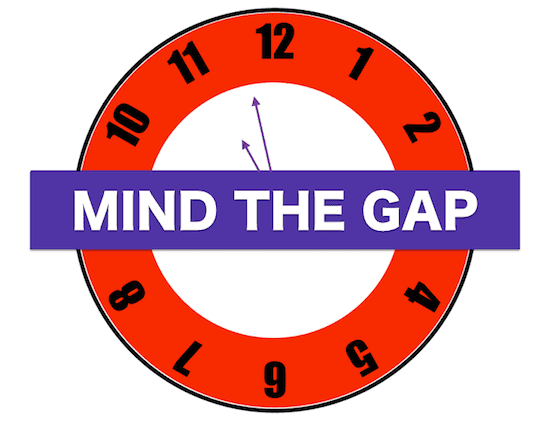Ever since my days at university, I feel like I have been involved with or needing to mind the gap. At the end of the day, it’s a great way to sum up my own mindset shift. I did a “gap year” — although it was hardly the fanciful backpacking world tour. I spent that year at another school, filling the gap between the grades I had and the grades I needed! More seriously, I studied Deconstructionism at university which could be described, at least in part, as the study of the gap. We are talking about the gap between the words, the gap between word and meaning, the gap between words and symbols or, even, the gap between law and justice.
A deconstruction of the gap
In a text by Professor John Phillips (National University of Singapore), looking at Jacques Derrida and Deconstruction, Phillips talks about some of the founding principles of deconstructionism and mentions the importance of the gap (or absence) as an essential part of defining and reinforcing presence:
[t]he ideal of presence always implies more than one moment…
a second moment of presence invades consciousness as absence–the disappearance of the world behind the veils of language, consciousness going astray, the reign of death, non-sense. In this way gaps, absences and deficiencies of all imaginable kinds are subordinate to a principle of presence. Is it possible to imagine an absence without reference to the principle of presence?”
on Deconstruction, by Professor John Phillips (NUS).
Put in other words, one could say that the gap helps to support, even define, who we are. {Tweet this ♺!}
The gap as a pause

In music, the pause is an essential beat. In the riveting work by musician and neurologist, Daniel Levitin, This is your Brain on Music, he analyzed how the brain reacts to the pause in music. The brain activity lights up in anticipation of the new outbreak of music. The gap as a breather, therefore, acts as a stimulant, giving greater value to the music that is about to come.
The gap in your agenda – the mindset shift on time
For many of us, especially in business, we feel like we are working in a race against time. The archenemy of productivity is when feel that we are the victim of time.{♺!} And, it is my observation that many too many executives are overrun by time and are not carving out enough time to act, much less think, strategically. For this reason, I systematically include “gaps” in my agenda. These gaps represent time to think, to do the unexpected, meet with someone new or just relax. We all need to mind the gaps in our agenda and not be constantly running from one meeting to another. Otherwise, what inevitably happens is that (a) you risk making strategic errors; (b) you will see a gap form between what you say and what you do and (c), more tragically, you will burn out.

The mindset shift requires new schooling
In that all of today’s senior executives (including myself) were trained under different times, it is my conviction that one of the biggest challenges to their mindset is how they manage their time and, by extension, their communications. The new schooling requires us to add in more gaps, to permit the mind to breathe, to allow for serendipity, and for more strategic reflection and action. {♺!}











Trackbacks/Pingbacks